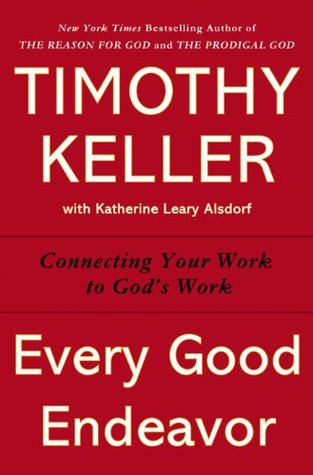More on this book
Community
Kindle Notes & Highlights
In Genesis chapter 1, verse 28 he tells human beings to “fill the earth and subdue it.” The word “subdue” indicates that, though all God had made was good, it was still to a great degree undeveloped. God left creation with deep untapped potential for cultivation that people were to unlock through their labor.27
Work is as much a basic human need as food, beauty, rest, friendship, prayer, and sexuality; it is not simply medicine but food for our soul. Without meaningful work we sense significant inner loss and emptiness. People who are cut off from work because of physical or other reasons quickly discover how much they need work to thrive emotionally, physically, and spiritually.
“To the Greeks, work was a curse and nothing else.”37 In fact, Aristotle said that unemployment—by which he meant the ability to live without having to work—was a primary qualification for a genuinely worthwhile life.38
While the Greek thinkers saw ordinary work, especially manual labor, as relegating human beings to the animal level, the Bible sees all work as distinguishing human beings from animals and elevating them to a place of dignity.
In Psalm 65, verses 9–10 and Psalm 104, verse 30 we find God cultivating the ground by watering it through rain showers, and, through his Holy Spirit, “renewing the face of the ground.” However, in John 16, verses 8–11, the Holy Spirit is said to convict and convince people of sin and God’s judgment—which is something a preacher does. So here we have God’s Spirit both gardening and preaching the gospel. Both are God’s work. How can we say one kind of work is high and noble and the other low and debasing?
This pattern is found in all kinds of work. Farming takes the physical material of soil and seed and produces food. Music takes the physics of sound and rearranges it into something beautiful and thrilling that brings meaning to life. When we take fabric and make a piece of clothing, when we push a broom and clean up a room, when we use technology to harness the forces of electricity, when we take an unformed, naïve human mind and teach it a subject, when we teach a couple how to resolve their relational disputes, when we take simple materials and turn them into a poignant work of art—we are
...more
If the point of work is to serve and exalt ourselves, then our work inevitably becomes less about the work and more about us. Our aggressiveness will eventually become abuse,
our drive will become burnout, and our self-sufficiency will become self-loathing. But if the purpose of work is to serve and exalt something beyond ourselves, then we actually have a better reason to deploy our talent, ambition, and entrepreneurial vigor—and we are more likely to be successful in the long run, even by the world’s definition.
The weeds, or the computer viruses, or the corruption scandals, come back with a vengeance. Research into the properties of the atom becomes the basis for the atomic bomb. In other words, work, even when it bears fruit, is always painful, often miscarries, and sometimes kills us.
When we remember that gardening is representative of all kinds of human labor and culture building, this is a statement that all work and human effort will be marked by frustration and a lack of fulfillment. “Part of the curse of work in a fallen world is its frequent fruitlessness.”94
Second, the book of Nehemiah is about an urban planner and developer who used his management skills to rebuild the wall of Jerusalem and reinstate stability so that economic and civic life could begin to flourish again.
However, you worked with talents you did not earn; they were given to you. You went through doors of opportunity you did not produce; they just opened for you. Therefore, everything you have is a matter of grace, and so you have the freedom to serve the world through your influence, just as you can through your competence.
All of us look to something to assure ourselves we have spent our lives well.
Idols of comfort and pleasure can make it impossible for a person to work as hard as is necessary to have a faithful and fruitful career. Idols of power and approval, on the other hand, can lead us to overwork or to be ruthless and unbalanced in our work practices. Idols of control take several forms—including intense worry, lack of trust, and micromanagement.
Some idols drive us toward indolence (comfort, pleasure) and some drive us toward exigence (power, approval).
Leaders often feel overwhelmed by the cynicism and apathy of their employees and lose their drive to hold true to the company’s values.


